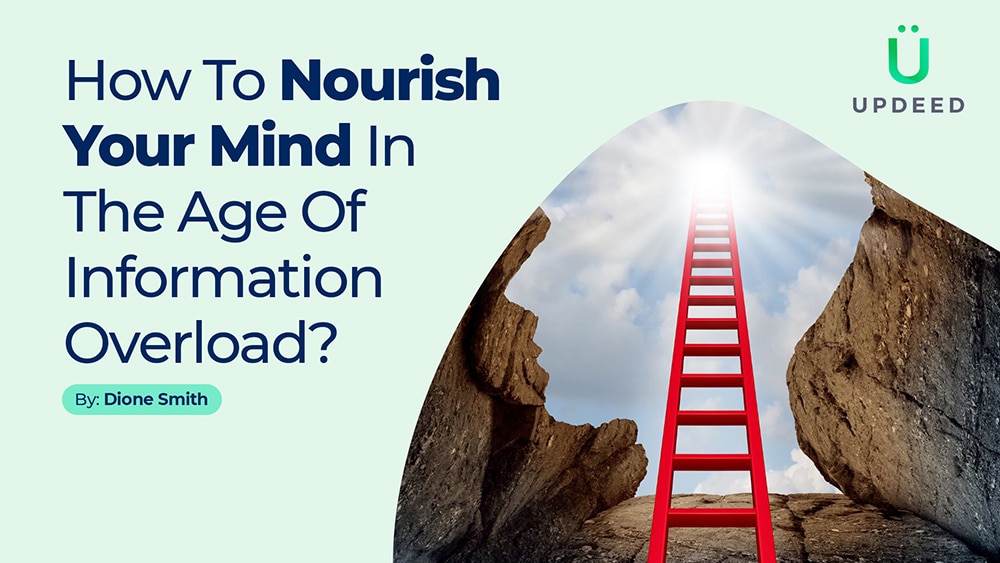How To Nourish Your Mind In The Age Of Information Overload?
As time passes, we start to learn more and more about the importance of mental health. And this new-found knowledge brought many changes that provide efficient contributors to help reduce the issue.
Today, we can access therapists through our handheld devices; we can find Home Companion Care, break requirements for work, and much more.
In an age where almost everything you can think of is accessible, one would think that that would absolve most of our issues. After all, they say knowledge is supposed to aid in building a society. However, the rise in advancements in accessibility has brought some downsides. One of them is âinformation overload.â

Information Overload (intoxication, information anxiety, or information explosion ) is when a person is exposed to too much information. This may sound harmless
and beneficial, but the reality is different. Because we humans are not individually capable of handling the level of information our modern world presents us.
Humans have always been capable of handling a limited amount of information. And once our brains are handed too much data, we struggle to absorb, process, and make sense of it before experiencing psychological symptoms like anxiety, mental fatigue, a sense of powerlessness and an overwhelming feeling. It can also lead to multiple cognitive issues, such as difficulty in decision-making or making hasty decisions (that are often detrimental).
How to Overcome Information Overload?
Information overload is detrimental to our overall mental well-being. The side effects usually become apparent in our daily lives by disrupting our quality of work and family time. If you have experienced or are experiencing these side effects, or wish to avoid experiencing information anxiety, try following the methods below.
Limit sources
Before hopping on the internet and engaging with each source of knowledge, list the sources you intend to visit and stick to the plan. This will help you to avoid going to too many sources, which not only takes up your time but can distract you from the information you have already processed and understood. For instance, if youâre looking for information on a specific topic and find five reliable sources, try picking only two or three to read.
Also, unless itâs an assignment, avoid news articles and limit your time on social media sites like Twitter and Facebook. The information there is unlimited and can also provide many contradicting pieces of information. This makes it more challenging for individuals to process data and easier to develop information overload.
Do a brain dump
A brain dump means removing the information from your brain and putting some internal data somewhere else. This may sound complex, but the method is simple and famously used in the olden days.
The best way to brain dump is to write everything downâthe information and the emotions it gives you. According to David Allen ( a productivity consultant ), âWriting [these thoughts] down gets them out of your head, clearing your brain that is interfering with being able to focus on what you want to focus on,â he says in his book. It also permits your mind to ârelax its neural circuits so that we can focus on something else.â
Settle on sources beforehand
When searching for new information, start by identifying reliable sources for each type of information youâre likely to consume. And stick by those sites. Doing this will help you avoid the trap of intaking misinformation and eliminate time spent searching and overloading with unnecessary information.
Take a break outdoors or meditate
Going outdoors is the best way to recharge mentally. Taking a break outside without your phone or listening to music can allow you to regain clarity, especially
around mother nature. People who tend to spend more time in nature enjoy enhanced cognitive functions and reduced levels of stress. They are also less likely to have anxiety disorders and depression and more likely to receive high levels of happiness and well-being.
Conclusion
Our modern-day world has contributed to many benefits in our survival as a society. But every good thing comes with its downsides. And itâs our responsibility to protect ourselves from those side effects. With the right type of information and resolution, we can live a healthy balanced life that will benefit us physically and mentally.
Author details:
Loving home care is an expert foundation that provides specialized care services for the elderly. It ensures that seniors are given the love and care that they deserve while aging. Whether it be lifestyle care, specialized care, or recovery care, loving home care health is always up with its great assistance and support .
Ready to make a positive impact in the world?
UPDEED is the place for you. Our free and open platform is filled with inspiring stories from individuals and organizations who are making a difference in their communities and beyond. Connect and collaborate with like-minded individuals from around the globe on UPDEED, and discover your own potential to create meaningful change. Join our community and make a difference.





